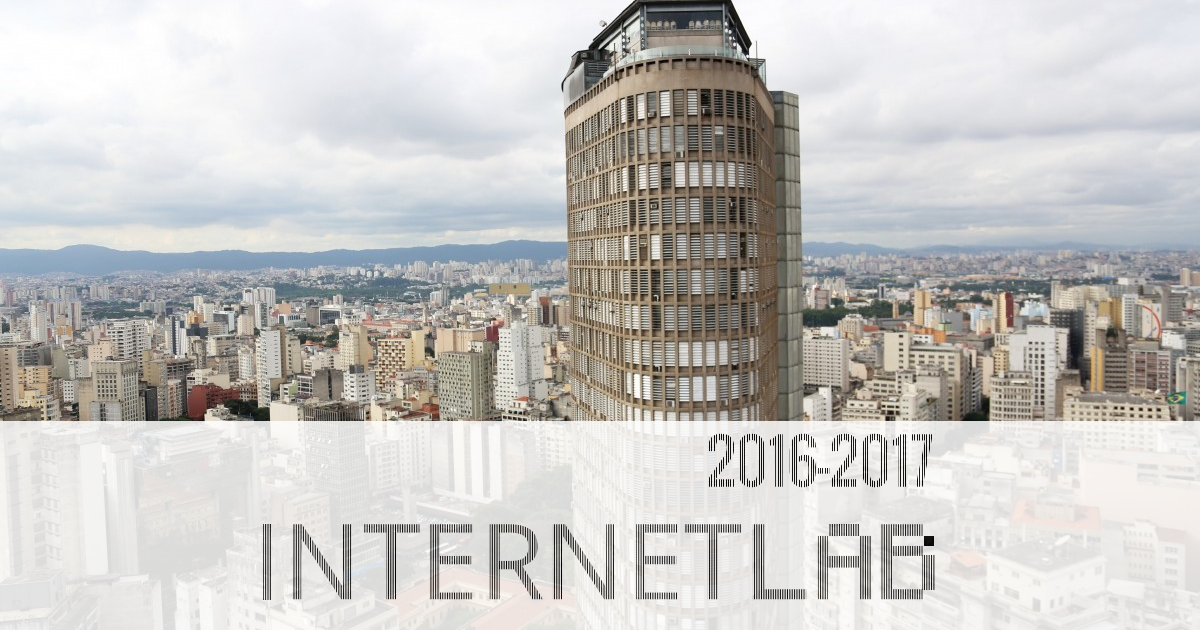
InternetLab releases 2016-2017 activity report
Between 2016 and 2017 we took important steps towards the consolidation of our structure, areas, and methods of action. In this publication, we share part of the activities we did during this period, by area and by sector (academic, with institutions, with the private sector, and with the community). The Directors’ Board Letter, which opens the report expressing our institutional views, is also available below.
…
Board of Directors’ Letter
Why is Research our Advocacy Strategy? In 2014, we founded InternetLab as an independent research center. As researchers linked to the University of São Paulo (USP), we were aware of the potential of research as a tool for analysis and social transformation. However, we came across constraints within the bureaucratic structures of USP that did not allow us to articulate effective advocacy strategies, which demanded more investment and autonomy. We were born in the same year as the approval of the acclaimed Marco Civil da Internet, the NetMundial conference, and a few years after the number of Internet users in the country exceeded more than half the population. These milestones inaugurated a new moment for the Internet discussion in Brazil; technology has come to mediate once and for all the political agenda and social relations, attracting the attention of the Judiciary, the Legislative, and the Executive. At that moment, we had multiple concerns. On the one hand, the harsh Brazilian social reality seemed to engender the risk that inequalities and violations of civil liberties would also be reproduced in the scope of technology so that it was imperative to add human rights advocates from different backgrounds. On the other hand, the forensic and manual tradition of legal research in Brazil, coupled with the lack of familiarity of the legal operators with the technical functioning of the new technologies, made the discussions of public policies in this field arid.
In this context, we realized that mediating the debate and building bridges of dialogue between different sectors was a prime task for technological advances to converge with the guarantee of human rights. In order to occupy this role of mediators and to bring actors and institutions closer to our standards, we had the first challenge to raise legitimacy. Our academic credentials and research baggage in the field of Internet policies were essential to open doors. Keeping them open, however, required more than that: we would need to prove our ability to contribute to the debate by providing impactful, independent, and, relevant research. Throughout our first 3 years of operations, this was our main focus. We structured lines of research that addressed previously unpublished issues in Brazil: we were pioneers in the debates about sharing economies and on issues related to gender violence on the Internet. In other topics, such as privacy and freedom of expression, we deepened the discussions with research that presented more concrete data about the reality in the country. The quality and methodological rigor of our research were fundamental to consolidate us as a reference and to keep the doors open. We participated in more than 10 public hearings in the National Congress, we contributed to the work of the Federal Supreme Court and the Federal Public Ministry, the Ministry of Justice, the Public Defender’s Office, and the Court of Justice of the State of São Paulo. We have been invited to events in more than 15 countries. Since 2014, we have been cited more than 200 times by national and international media.
The academic legitimacy we have achieved has been accompanied by a constant concern with our communication and engagement strategies. Thinking of innovative ways to disseminate research results and to spread knowledge has also been one of our main challenges. From books to videos and multimedia materials, the diversity of formats is important to reach different audiences, from the youngest and engaged to the most experienced and conventional. In erecting our independent institutional structure, we also do not abandon the University. Whether it is teaching, establishing institutional partnerships for courses and events, we see the university space as an important point of incidence, offering future professionals and researchers the necessary tools to face these debates in a critical and informed way. In 2017, we are clear that our differential lies in investing in research as an advocacy strategy. By generating precise diagnoses about the Brazilian reality, we are able to act as important mediators of the debates on technology, public policies, and human rights. For this reason, our work is both essential and complementary to that of other organizations: the combination of knowledge production and mediation between different sectors now occupies a strategic space in the construction of a more connected and more equal Brazil.
Dennys Marcelo Antonialli | Executive Director
Mariana Giorgetti Valente | Director
Francisco Brito Cruz | Director
